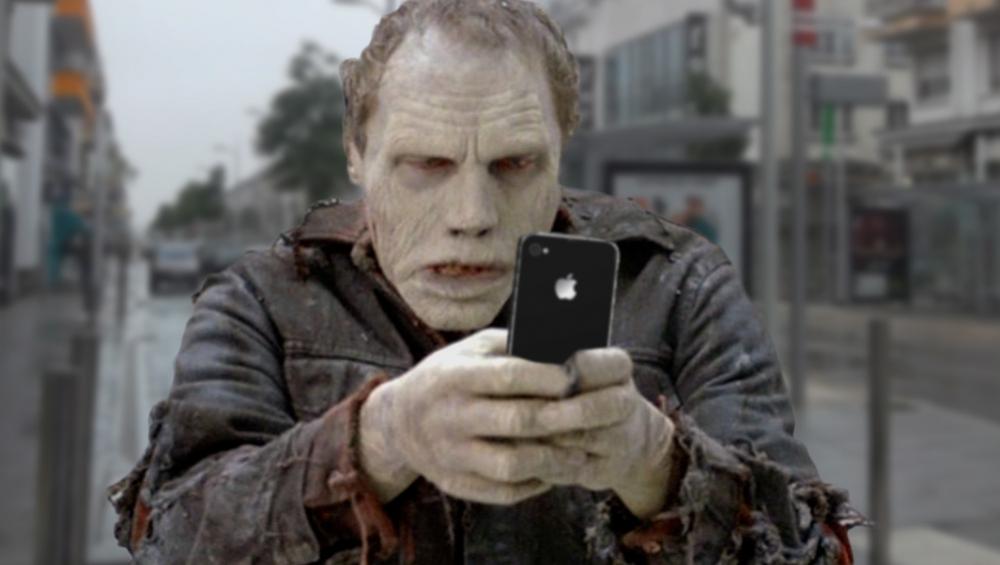The walking dead: how smartphones bring to the hospital
In Chongqing, there is a special lane for pedestrians with smartphones, and in Utah, USA, fans of writing sms are fined $ 50 on the go. At first glance, this seems funny if the use of smartphones didn’t really bring people to the hospital.

People are distracted by smartphones while walking down the street, write messages and sit on social networks, even when they cross the road. Distracted attention is fraught with consequences for health and life. Pedestrians with phones go to red and ignore traffic signs, crash into trees, stumble over curbs and fall from bridges, go on fresh asphalt. This leads to injury, and sometimes death.
In 2012, seventy-eight thousand pedestrians were injured in the United States. Of these, ten percent of the incidents were phone related. From 2010 to 2014 in New York, the number of injuries caused by careless walking with a smartphone in hand, increased by thirty-five percent. According to Stanford, the total number of accidents involving pedestrians distracted by a telephone from 2004 to 2010 has tripled.
')
Smartphones have become a problem not only in the hands of drivers . How to deal with this problem? The authorities in New York had to lower the speed limits on the streets to prevent traffic accidents. In Utah , a fine of fifty dollars was introduced for those who like to walk along the railway, buried in a smartphone. In Portland, Ore., Sound alerts are being tested. In Delaware, “Look up” is written on the sidewalk before going. In Toronto, pedestrians lecture about the dangers of using the phone on the road.

If a pedestrian goes on the transition - he is right! But what is the point in his being right, if the driver of a car or motorcycle just does not have time to stop when a person with a smartphone, without looking around, starts to cross the road?
The Stack editor Martin Anderson notes a change in pedestrian culture. Over the past few years, people in London have diminished their desire to give way to another. Today, people simply do not see each other before they face each other.
Stanford warns.


People are distracted by smartphones while walking down the street, write messages and sit on social networks, even when they cross the road. Distracted attention is fraught with consequences for health and life. Pedestrians with phones go to red and ignore traffic signs, crash into trees, stumble over curbs and fall from bridges, go on fresh asphalt. This leads to injury, and sometimes death.
In 2012, seventy-eight thousand pedestrians were injured in the United States. Of these, ten percent of the incidents were phone related. From 2010 to 2014 in New York, the number of injuries caused by careless walking with a smartphone in hand, increased by thirty-five percent. According to Stanford, the total number of accidents involving pedestrians distracted by a telephone from 2004 to 2010 has tripled.
')
Smartphones have become a problem not only in the hands of drivers . How to deal with this problem? The authorities in New York had to lower the speed limits on the streets to prevent traffic accidents. In Utah , a fine of fifty dollars was introduced for those who like to walk along the railway, buried in a smartphone. In Portland, Ore., Sound alerts are being tested. In Delaware, “Look up” is written on the sidewalk before going. In Toronto, pedestrians lecture about the dangers of using the phone on the road.

If a pedestrian goes on the transition - he is right! But what is the point in his being right, if the driver of a car or motorcycle just does not have time to stop when a person with a smartphone, without looking around, starts to cross the road?
The Stack editor Martin Anderson notes a change in pedestrian culture. Over the past few years, people in London have diminished their desire to give way to another. Today, people simply do not see each other before they face each other.
Stanford warns.

Source: https://habr.com/ru/post/376769/
All Articles